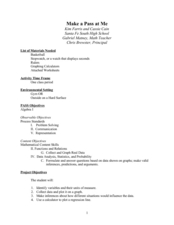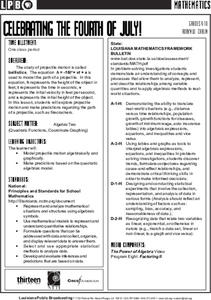Have Fun Teaching
Making Inferences (6)
The story of Petey and Ralphie provides readers with the perfect opportunity to practice using clues in a text to draw inferences. The questions that follow the story direct readers' attention to details that imply rather than directly...
Chicago Botanic Garden
Recognizing Change (Observation vs. Inference)
What is the difference between making inferences and making observations? Young climatologists refer to a PowerPoint to make observations on each slide. They record their observations in a provided worksheet before drawing a...
K12 Reader
What Happens Next?
While your students may not be psychics, that doesn't mean they can't predict what will happen next in a story. To hone this important reading comprehension skill, young learners read a series of three short passages before writing a...
Curriculum Corner
Inferencing
Inferencing is a necessary reading skill to uncover non-explicit messages in text. Use the set of resources as a way to guide learners toward becoming expert inferrers through reading prompts and literature with text and without text.
Curated OER
Making Predictions by Analyzing Key Ideas and Details
Students make predictions. For this language arts lesson, students read nonfiction texts and make predictions about what they are going to read. Students confirm and revise their predictions as they read the text.
Curated OER
Sequence, Predict, Infer: Pink and Say
Practice sequencing with your 2nd graders via Patricia Polacco's Civil War book Pink and Say. Begin with a blindfold and a bag of mystery items. Connect their use of clues to identify what they can't see with the skill of making...
Curated OER
Observation and Inference
Assess your young scientists' understanding of the difference between observation and inference with this 20-question multiple choice quiz. It reviews a variety of physics and astronomy concepts, such as solar eclipses and sunspots, the...
Curated OER
The Gingerbread Boy Comes Alive
Students make cut-out gingerbread cookies. After reading "The Gingerbread Boy", their cookies "disappear" and students must make predictions and draw conclusions about what happened to their cookies.
Curated OER
Two Greedy Bears
Improving listening comprehension skills is the goal of this language arts lesson. Young readers listen to the story Two Greedy Bears, stopping to have discussions with a partner. They predict outcomes and make inferences based on...
PBS
Blue Ribbon Readers: Drawing Inferences
Model for young readers how to use illustrations, chapter titles, and events in a story to draw inferences and make predictions. Learners then practice these essential comprehension strategies by drawing inferences for another section of...
Curated OER
The Tell - Tale Heart
Students read The Tell Tale Heart and practice critical analysis while reflecting on its underlying meanings. In this reading instructional activity, students make predictions, monitor their own comprehension and adjust their reading...
Pennsylvania Department of Education
Analyzing Key Ideas and Details in Nonfiction
Learners explore nonfiction texts. In this language arts lesson plan, students read a nonfiction text and make predictions. Learners identify facts and opinions in the text and draw conclusions as they read.
Curated OER
Make a Pass at Me
Students identify different types of functions and units of measurements. In this statistics instructional activity, students will collect data, graph their data and make predictions about their data. They plot a linear regression graph.
Curated OER
Inferring Themes
Fifth graders practice making inferences on various types of reading material. As a class, they develop a definition of the word "theme" and discuss themes for some of their favorite stories. They use the context of the reading...
Curated OER
Lesson Three: Strategies to Infer
Third graders make inferences with a text. In this inferring activity, 3rd graders read Town Mouse Country Mouse by Jan Brett and they discuss the differences between city and country life. They make inferences as they read on the...
Curated OER
Clouds
Students explore clouds. In this weather lesson, students identify the steps in the water cycle, define condensation and evaporation, and relate this information to cloud formation. Students perform a cloud experiment, predict weather...
Curated OER
Tomas and the Library Lady
Students practice read aloud comprehension strategies. In this literacy comprehension lesson, students listen to Tomas and the Library Lady, stopping to discuss with a partner aspects of the story suggested by the teacher. Students make...
Curated OER
Magazine Madness
Students look at pictures cut out of magazines to determine what is happening in the picture and predict what will happen next.
Teacher's Corner
Hey Batter, Wake Up!
Does jet lag affect a baseball team's performance in games? Read about how a baseball team's chance of winning a game can be affected by traveling over one, two, and three time zones. Readers then respond to five short answer questions...
Curated OER
The Human Line Plot
Fifth graders collect data and use charts and line plots to graph data. Through class surveys, 5th graders collect data concerning a particular subject. They graph their data using a line graph. Students make inferences and predictions...
Curated OER
Celebrating the Fourth of July!
Students model projectile motion algebraically and graphically; and make predictions based on the quadratic algebraic model.
Curated OER
Probability and Expected Value
Students collect data and analyze it. In this statistics lesson, students make predictions using different outcomes of trials.
Curated OER
Don't Let Parabolas Throw You
Students identify relation, function, patterns and range. In this algebra lesson plan, students factor and graph quadratic equations. They use transformation to move the parabola around and make predictions.
Curated OER
Pre- and Post-Reading Plan
Students are introduced to pre- and post-reading strategies. Individually, they read excerpts of a story while making predictions about what they believe is going to happen next. After reading the selection, they answer comprehension...

























